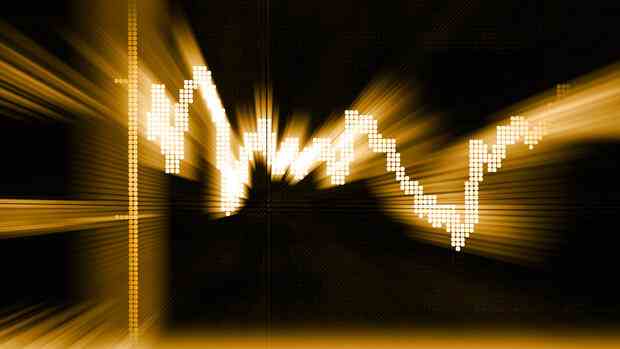Dusseldorf The German stock market fell back slightly on Tuesday. The leading index Dax closed a total of 0.4 percent weaker at 13,885 points. The daily low was 13,792 points.
The current development on the stock exchange is not unusual. At the start of the week, the Dax was briefly above 14,000 points. But the barometer did not manage to overcome the round mark as the first resistance on the way up.
As a result of the failure to overcome a mark on the top, the focus on the bottom is now the 200-day line, which is so important for the market at currently 13,567 points. As long as it holds, the ongoing consolidation is still healthy. Such a pullback on the line would be down 8 percent from the highest level in recent weeks, a more usual consolidation.
For the capital market expert Thomas Altmann from the investment house QC Partners, all investors could certainly have done without the losses so shortly before Christmas. But this setback could also have a positive effect. “It is possible that this consolidation is now creating the breeding ground for a better year for stocks in 2023,” says Altmann.
Top jobs of the day
Find the best jobs now and
be notified by email.
The reason for the price losses on Tuesday was provided by the Bank of Japan (BoJ). The monetary authorities decided to loosen the range in which the long-term bond yield moves. “The increase in the permitted interest corridor is nothing more than an interest rate hike through the back door,” explains Altmann.
>> Read here: Sudden reversal by monetary watchdogs – Japan’s central bank shakes the markets
Up until that point, the BoJ had always insisted that it was the only major central bank in the world to maintain its strategy of ultra-loose monetary policy and support for domestic demand. On the trading floor, many expected that the Japanese central bank would verbally prepare the market for changes in its monetary policy. But that the Bank of Japan is already acting today comes as a big surprise.
And negative surprises are a sell signal in consolidation phases. “If these shock waves hit a low level of market liquidity so shortly before Christmas, then the price losses can be quite severe,” explains Altmann.
Apparently, the reverse of a well-known proverb applies on the stock exchange: all bad things come in threes. Within a few days, three central banks – the US Federal Reserve, the ECB and now the Bank of Japan – have disappointed the stock exchanges with unexpectedly restrictive monetary policies.
Today’s reaction on the markets is typical for the entire stock market year 2022: the prices of stocks and bonds are falling at the same time. In turn, bond yields rise. At 2.29 percent, the value of a Bund reached its highest level since 2011. The yield on a two-year Bund climbed to 2.50 percent, a new 14-year high.
The yield on a ten-year Japanese government bond jumped by more than 60 percent after the central bank’s decision – from 0.256 percent previously to as much as 0.415 percent.
Short sellers increase positions in Varta shares
Meanwhile, the crisis-ridden battery manufacturer Varta wants to reduce its material costs. These have “increased by 25 percent over the course of the year. They make up 50 percent of our total costs,” said Varta boss Markus Hackstein of the “FAZ”. “Material costs must go down.”
Despite the current problems, Varta boss Hackstein does not assume that Varta could become a case for the insolvency administrator. “We are solidly positioned and have taken the necessary measures,” emphasized the manager. “We assume that Varta will still exist in 140 years.”
However, the stock remains the short seller’s favourite. At no other paper is the proportion of short sales as high as at the battery manufacturer. According to the Federal Gazette database, there is currently a short sale rate of 9.13 percent of all freely tradable shares.
Short sellers rely on falling prices with so-called short sales. To do this, they borrow shares for a small fee and sell them immediately in the hope that prices will fall and they can buy back the shares at a lower price before the return date. The difference between the sell and buy price is your profit.
The fact that the short sellers are not closing out their positions is more of an indication that the share price will continue to fall. Because there have been plenty of opportunities to realize high profits in recent months. The Varta paper has slipped by around 80 percent since the beginning of the year. The minus in the past three months amounts to 62 percent.
Although some hedge funds have slightly reduced their short sale quota in the past few trading days, the quota has actually increased overall. The British fund Marble Bar increased its short sale rate by almost 50 percent on Thursday and Friday last week – from 1.08 to currently 1.52 percent.
On Tuesday, Varta shares closed at EUR 22.73, down 0.5 percent. The high is EUR 181.30 and was reached in early 2021.
Look at other individual values
Pfeiffer Vacuum: The company is raising its sales forecast for the year just ended. The stabilization in the supply chains and the very good delivery performance of Pfeiffer Vacuum contributed to the improvement in the sales forecast. The stock gained 1.65 percent.
Klöckner & Co.: The titles gained 0.3 percent after a purchase in Mexico. The steel trader is buying the National Material of Mexico, a provider of materials for the automotive industry and other industrial sectors, for $340 million. A trader noted that the company could need money for a major acquisition.
Here you can go to the page with the Dax course, here you can find the current tops & flops in the Dax.
